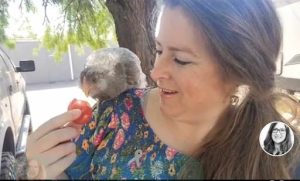Meet Honey, the endearing and comically crooked-beaked Blue Andalusian who taught me firsthand how to build trust.
Honey places more trust in me than my other chickens; she even has a habit of perching on my shoulder like a parrot. Our bond deepened recently when I rescued her from a red-tailed hawk’s attempted fast food run. As the other chickens sought cover, Honey instead ran to me, finding safety in my presence.
Reflecting on this incident, I’m struck by how trust, earned through time and shared experiences, forms the foundation of relationships. Much as Honey instinctively turned to me for protection, our trust in others grows as we spend time together, demonstrating reliability. Trust forms the foundation of relationships.
During a recent LDS General Conference, President Russell M. Nelson emphasized the importance of trusting spiritual leaders over public opinion. His words resonated with me:
Seek guidance from voices you can trust—from prophets, seers, and revelators and from the whisperings of the Holy Ghost, who “will show unto you all things what ye should do.”
President Nelson, a figure of trust for me, embodies qualities such as honesty, conscientious decision-making, and a genuine desire for the well-being of others. My trust in him is akin to the trust Honey places in me—built over time through positive experiences.
However, the challenge lies in distinguishing trustworthy voices amid a cacophony of squawking opinions. I believe we can discern voices we can trust through their honesty, integrity, conscientious decision-making, loyalty, trust-building over time, vulnerability, emotional resilience, expertise, and humility.

The adage “honesty without tact is cruelty” captures the essence of truthfulness. In a world where communication is paramount, the ability to express truth with compassion is a highly skilled art form. It fosters understanding, strengthens relationships, and ultimately contributes to a more compassionate society. As Theodore Roosevelt said, “No one cares how much you know, until they know how much you care.” The tone, choice of words, and the overall delivery become the brushstrokes that paint the emotional landscape of a dialogue. While there is a multiplicity of pitfalls to brutal honesty, many individuals still prefer it over placating fake niceties. This delicate performance of tactful truth is essential in building trust.
Maintaining this balance, we recognize that integrity in communication is indispensable and equally precious. The lens through which we view the world influences our reception of information, either embracing it charitably or resisting it defensively—respectful communication becomes the bridge that fosters understanding, enabling constructive dialogue even amidst differing perspectives. Approaching conversations with an honest curiosity about the other person’s perspective promotes respect. I recently participated in an interfaith conversation that was unpleasant from the very start. The other person’s rudeness tempted me to reciprocate, leading to an unproductive tug-of-war where both of us expended energy without making any progress. A moment of self-awareness enabled me to disengage from the futile situation. Self-awareness enables individuals to manage emotions, avoid unintentional offenses, and adapt their communication tone to suit the situation. Without acknowledging and respecting another person’s culture, beliefs, background, and humanity, there is no point in expecting to establish a meaningful rapport with them to share your own thoughts. When individuals consistently demonstrate thoughtfulness through thoroughness and a genuine commitment to ethical considerations, they convey reliability and integrity.
Conscientiousness instills confidence in others. As a teen, I once sat at a party talking with a new acquaintance, who promptly took out a knife and stabbed a balloon hovering over my head. Needless to say, any inclination I had toward building a connection there came to an abrupt end as well. While their intention was to showcase a new knife, it came at the cost of my sense of security. Trust-building hinges on the predictability and coherence of one’s choices, and conscientious decision-making serves as a powerful signal of accountability and principled conduct. It communicates respect for the consequences of one’s actions and fosters an environment where individuals feel secure and valued. Conscientiousness instills confidence.
This naturally segues into the discussion of the virtue of emotional resilience—an individual’s adeptness at adapting and recovering from adversity, stress, or substantial life challenges. During times of intense stress as a heart surgeon, Russell M. Nelson was known for being level-headed. He said, “It’s a matter of extreme self-discipline. Your natural reaction is, ‘Take me out, coach! I want to go home.’ But of course you can’t. A life is totally dependent on the whole surgical team. So you’ve got to stay just as calm and relaxed and sharp as you ever were.” Emotional resilience is not about how much stress you can take; it’s having the tools to navigate challenges, manage emotions, and emerge stronger.
Emotional resilience begs us to patiently take our time in building trust. Trust-building happens gradually and slowly—it’s a delicate endeavor. Both parties must contribute to its consistent development. While first impressions are helpful for the initial steps of a quickly formed trust, this must eventually evolve over time if we want to achieve long-term genuine trust. American writer and humorist Joe Abercrombie is often attributed with the proverb, “Trust comes in a thimbleful and departs in a bucketful.” In essence, this highlights the fragility of trust. It’s also a reminder to us that once trust is established through long-term effort, we should exercise caution before hastily discarding it the second things become unclear, confusing, or even hurtful.
This period of seeing an uncomfortable moment through often requires individuals to be vulnerable with each other. Brené Brown reminds us, “Staying vulnerable is a risk we have to take if we want to experience connection.” Inevitably, all human interactions can become strained and awkward at times. Effort and time are needed to rebuild when the occasion arises that trust is damaged. Adapting expectations involves recognizing that an integral aspect of building trust includes the occasional need for repairs to the bridge of understanding. Navigating trust-building involves the significant contributions of patience, care, politeness, intuition, cultural sensitivity, desire for repair, and various other elements.
In the New Testament, Matthew pleads for all of us to become like little children. This is a call to be teachable and to embrace vulnerability in order to build trust. Vulnerability is often overlooked but is vital in building trust in a relationship. It’s not a passive stance; rather it’s a radical boldness to be humble and open to feedback. This is similar to my trust in President Nelson’s spiritual guidance. While he, like all humans, isn’t perfect, his teachings have been highly instrumental in connecting me to spiritual nourishment, even to the bread of life, Jesus Christ. Humility is not a sign of weakness; it’s a bold act of strength. It takes courage to admit mistakes, to learn from others, and to embrace a humble mindset in a world that often values preservation of one’s ego. Trust-building happens gradually.
For example, when I was diagnosed with a brain tumor, one person counseled me to get hypnotherapy and use my faith to blink the tumor away into thin air. Conversely, my neurologist, with years of study and practice, advised that the most effective course of action was prompt and decisive surgery to remove the tumor. I truly believe that the neurologist was the qualified person worthy of my attention and heed. Listening to his expert advice based on ample experience was the blessing God offered me. My surgeon had paid a price of several decades of learning and practice to know what he knew. Much like my choice to heed the experienced advice of a neurologist during that health crisis, seeking spiritual guidance involves turning to those who have paid the price in gaining spiritual understanding to be considered experts.
My experience with Honey reinforces the universal principles of how to build trust in all aspects of life. Drawing parallels between Honey’s trust and the recent counsel from President Russell M. Nelson, we see that trust isn’t blind acceptance; it’s a discerning choice based on shared experiences, reliability, and a commitment to mutual well-being. Our trust in others flourishes through the expressions of vulnerable reliability, preserving patience as we strive to comprehend each other amidst our imperfections.















